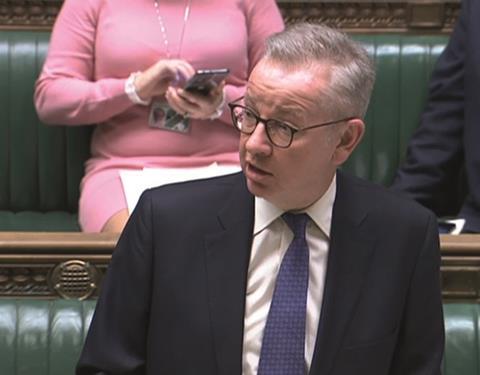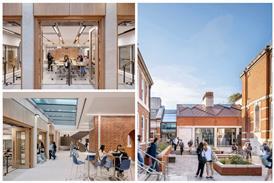RIBA also tells ministers it’s “not convinced” that measures to boost housing delivery go far enough

Proposals to update national planning rules to increase focus on maintaining the existing “character” of local areas and promote “beauty” in new development could be counterproductive and will require an influx of design talent at local planning authorities, architects have said.
RIBA also warned that changes to the National Planning Policy Framework outlined in the Levelling-Up and Regeneration Bill, such as a relaxation of requirements for local authorities to demonstrate a five-year supply of deliverable land for housing, could slow the delivery of new homes in some areas.
Its concerns come in a 20-page response to a government consultation on the planning-reform elements of the bill.
RIBA said the use of descriptive words such as “character” and “beauty” were “problematic in the context of the proposed revisions of the NPPF” because they were subjective issues open to interpretation.
“While the NPPF stipulates that principles in local design guides or codes will be one measure of character or beauty, we are not fully satisfied that these will provide the level of definition necessary to ensure that character is not used as a reason to refuse necessary and otherwise high-quality development,” It said.
Elsewhere, the RIBA consultation response argues that while “beauty is an objective of architecture” it is “only one element” of creating a successful building or place. It adds that affordability, accessibility and sustainability also needed to be key considerations.

“Beauty must be incorporated into a broader definition – quality design – which is focused on securing positive outcomes for the people that will use and interact with the place,” RIBA said. “This in turn can only be achieved through the improvement of the wider planning and development process, rather than overtly prescriptive guidance on the style of new development.”
“Short-sighted”
RIBA said members who fed into its consultation response felt that discussions about the importance of beauty that were not accompanied by a commitment to include architects and qualified designers in planning departments felt “short-sighted”.
It added that one outcome could be a focus on schemes considered to be “beautiful” but which had poor sustainability credentials. Another concern was that a requirement to fit in with the “existing characer” of an area could be a counterproductively low bar for areas “characterised by poor-quality development and a lack of amenities”.
The consultation response called for the revised NPPF to include an explanatory note on the precise definitions of character and beauty, with justifications. RIBA said those justifications should include one specifically related to density and the production of a more sustainable housing stock.
RIBA president Simon Allford said ministers needed to ensure that architecture is at the heart of building design to ensure the government’s ambitions to level up the built environment.
“The revised National Planning Policy Framework rightly focuses on the importance of levelling up,” he said.
“Quality and inclusive design must be prioritised alongside quantity. We must build sustainable homes that will stand the test of time in places where people want to live where there is the infrastructure to support them.”
Allford said RIBA members were “not yet convinced” that the government’s proposals would be enough to increase housing supply to the levels the nation needs.
According to statistics released in November, there were 232,820 net additions to England’s housing stock in the year to March 2022 – an increase on the previous year, but significantly below the government’s previously-stated target of 300,000 new homes a year by the middle of the decade.
Allford added that architects were very pleased to see the government’s proposals considered the importance of utilising existing infrastructure. But he said that could not be allowed to “disincentivise” affordable-housing delivery elsewhere.
The planning-reform consultation is open to responses until 11.45pm tonight.
















3 Readers' comments